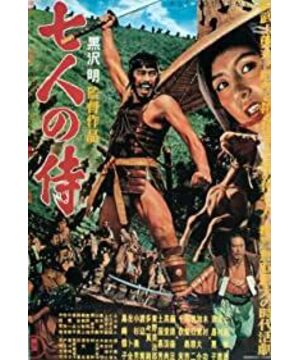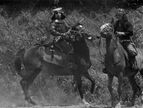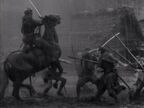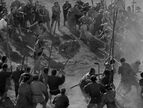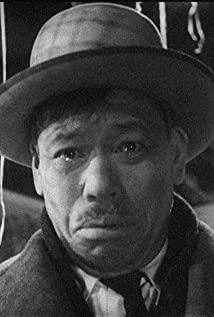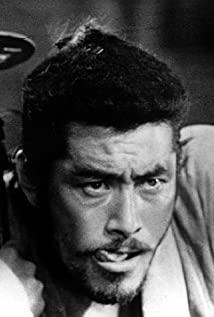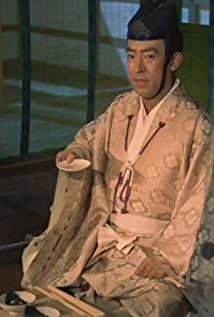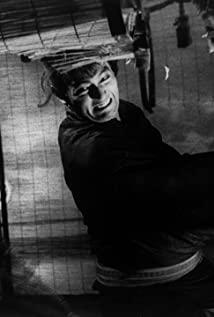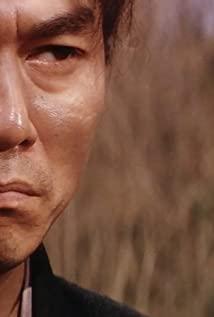As the leader of the Seven Samurai Kanbingwei said, they help the peasants against the bandits without any fame or fortune. Of course, it's not for "meal and fullness during the period." Except for the counterfeit samurai Kikuchiyo who participated in the battle because he was the son of a farmer, the others were simply for their belief in Bushido and sympathy for the farmer. They defend the honor of the katana with their lives. In the age of film performance, they are a group of people who are declining, and they are the adherents of the last ideal of Bushido.
Kanbei said to Katsushiro: "When I was young, I was the same as you. You want to practice martial arts, then go to battle, and finally become the lord of one city and one place. But just thinking about it, your hair will be gray. My parents are no longer there, and I don’t have a piece of land to sleep.”
This is the fate of the samurai later. This is the greatest ridicule for idealists in every era without ideals.
In the movie era, Bushido is gradually being forgotten, and some samurai may not even be able to eat rice. When the musket gradually replaced the katana, the arrogant and lonely ideal handed down in the Cold Weapon Age has become outdated, and they are still sticking to it meaninglessly. Like the wind, they left the land and peasants that gave birth to them to pursue the righteousness of the world. It seemed so ethereal, yet so ethereal.
The times have abandoned them mercilessly, and they are also deviating from the times with their solar terms and ideals.
So why don't farmers want their daughter Shino to be with the samurai Katsushiro? Because the samurai has no future. If they choose to be a samurai, they have chosen this future without a future.
(2) Farmers-They only have
the "Samurai" Kikuchiyo, who was born as a farmer's son in the movie, said:
There is no worse guy than a farmer in the world. They will say that they have no rice or wheat. There is nothing, but they have, everything! ...A serious face, bowed his head in salute, but lied! Wherever there is a war, they immediately used bamboo spears to stab the defeated warriors... They were stingy and cunning, but also stubborn, bad-minded, stupid, and cruel.
This is the "people".
Seeing the samurai disdain, as soon as the alarm sounded, "Samurai-sama, please help us." He trembles when he hears the thief, and after the samurai catches a thief, he immediately surrounds him and beats or even kills him. Isn’t this very similar to our real life, when the police chasing the thief, there is no one to help stop him, but to catch him? After staying in the thief, everyone immediately stepped up and stepped on it?
The first samurai to die was indirectly killed by the peasants they wanted to protect. This is simply an interpretation of the Japanese movie version of "the heroes of the people often die in the hands of the people".
And Kiku Chiyo also said: Who made them so stingy and incompetent? It's a samurai. ……You said what the common people should do, what can they do?
If an era produces many sad and despicable people, then this era is also sad and despicable.
In the end all the bandits were killed, and the farmers sang and danced in the fields, celebrating "their" victory. I completely forgot the three surviving samurai standing far away and the four samurai swords stuck in the new grave. And the peasant girl no longer glared at the young warrior.
They won, and they resumed their previous lives—even happier. They no longer need samurai.
But, what if there are more bandits in the future?
(3) Wind and rain, muskets-they defeated the samurai
. One symbol of this film is wind. "Samurai... just like the wind, just blowing from the earth, sweeping across... the earth will never move... the peasants are always with the earth and live forever!"
They just blew Afterwards, they raised the flag and the dust. Only afterwards, no one remembers it anymore.
The appearance of wind and rain in many places in the movie also represents the irresistibility of fate and the irreversibility of changes in the times.
Another symbol is the musket. All four samurai died under firearms. In front of the hot weapon that can kill a few hundred meters away, the sword has been left behind by the times. Even the samurai themselves have to snatch the enemy's muskets for their own use.
The musket is a sign of the advancement of the times. In the face of the arrogant, domineering, easy-going musket of Yang Ru, the beautiful and classical Bushido appears so fragile. At the time when the noble classical heroism is dying out of the era, no one can stop the wheel of history. Of the seven samurai who wanted to persist, four had been ruthlessly run over by the wheels of history and fate. The remaining three, watching the farmers they protect resume their daily lives, but they are no longer remembered, and said:
"We finally survived again."
What about next time?
At the end of the film, Kanbei said: "It is not us, but the peasants who have won."
Yes, at any time, the samurai and heroes will not be the victors.
It was not a bandit, a peasant, or a musketeer who defeated the seven samurai. But the fate and fate of helpless times.
View more about Seven Samurai reviews


